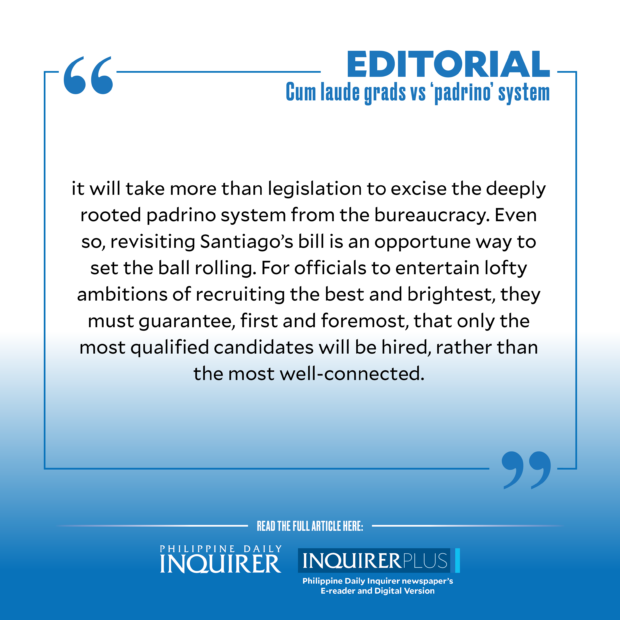Cum laude grads vs ‘padrino’ system

Hoping to attract the best and brightest, the government has sounded a call to college graduates with Latin honors to join the public sector, reminding them that they are automatically eligible to apply for first and second level positions in the bureaucracy. “Summa cum laude, magna cum laude, and cum laude graduates no longer need to take the career service exam as they may avail [themselves] of the special eligibility,” Civil Service Commission (CSC) chair Karlo Nograles said last week.
While reasonable, the appeal is a telling sign that the government must be struggling to entice the most promising jobseekers to take up public service despite competitive salary rates and benefits across multiple disciplines.
The reasons for this are not a mystery to anyone familiar with officialdom: red tape, a large number of unfilled positions, an even larger number of casual workers, and, of course, that perpetual blight on the bureaucracy—the so-called “padrino” or patronage system.
‘Best employers’
There’s no doubt that the government is a desirable employer if judged solely by the salary and perks of regular employees—contractuals being a separate matter entirely—not to mention its innate stability that private sector companies can only dream of.
In fact, based on an October 2023 survey by Inquirer and market research firm Statista, the Bureau of Fire Protection (BFP) and the Supreme Court emerged as the first and fifth “best employers” in the country, respectively, joining the likes of Google, Ayala Land, and Asian Development Bank.
But the sad truth is that BFP and the Court, along with a few other public offices with relatively modest manpower resources, are the exceptions rather than the rule.
As of June 2023, CSC data show there are about 1.97 million personnel in career and noncareer positions. But a whopping 832,812 others are “job order” or “contract-of-service” workers, proving that the government is still the top employer of often exploited and poorly paid contractuals.
And then there is the padrino system.
In a January 2021 radio interview, CSC Commissioner Aileen Lizada revealed that in many offices, unfilled positions were being “reserved” for “co-terminus” appointees by mere virtue of their social, political, or familial connections. “That’s really quite shocking … because hiring should be based on merit and fitness,” she said.
Favoritism, nepotism, cronyism
“That padrino system has been there for a long time … if you’re well-connected, they would ask you to take the eligibility exam, and even if you fail repeatedly, they won’t open the position [to others],” Lizada lamented.
A February 2024 paper by Eastern Visayas State University professor Sheldon Agaton explored the origins of the padrino system, a phenomenon marked by favoritism, nepotism, and cronyism. Originally, according to the study, the padrino system revolved around the Christian relationship between a godparent and a godchild, in which the former serves as a second parent to the latter. But as the padrino system pervaded our society, according to the paper, it “cascaded into non-religious” realms, including politics, mutating into its ugly form today.
In January 2015, another study by University of the Philippines Tacloban scholar Lorraine Villaluz described how elected officials “used their victory to reward supporters [with] government employment irrespective of supporters’ qualifications.”
“Such a practice has ignored the civil service rules and regulations regarding recruitment and has compromised the quality of public services,” she wrote. Worse, added Villaluz, “politically employed personnel tended to perform poorly, affecting bureaucracy.”
‘Political recommendations’
A way out of this quagmire was proposed by the late senator Miriam Defensor Santiago in September 2008, when she introduced the “anti-political recommendations” bill, to deprive incumbent officials of the power to “influence the appointment of persons to government posts through the exercise called ‘political recommendations’.”
“This perpetuates the ‘padrino system’ which allows the appointment of unqualified individuals to government positions over those who are really qualified based on their merits,” she said. Santiago’s bill had proposed extremely light punishment that bordered on a slap on the wrist for violators: a fine of no more than P1,000 and a prison term not exceeding one year, or both.
Alas, the measure never made it past committee level, like ill-fated attempts in Congress to ban that other scourge in governance—political dynasties.
And like political dynasties, it will take more than legislation to excise the deeply rooted padrino system from the bureaucracy. Even so, revisiting Santiago’s bill is an opportune way to set the ball rolling. For officials to entertain lofty ambitions of recruiting the best and brightest, they must guarantee, first and foremost, that only the most qualified candidates will be hired, rather than the most well-connected.















